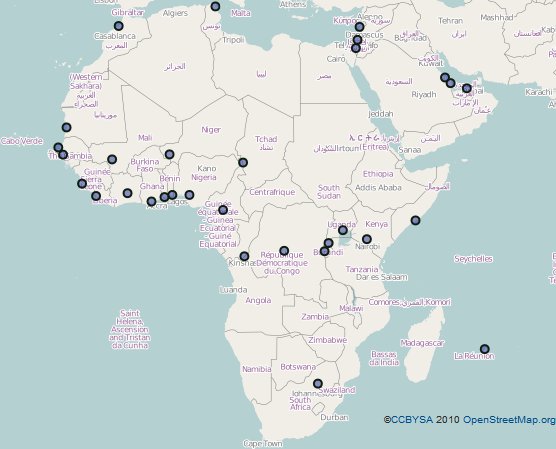Snapshot of Internet Society Chapters in Africa
For over 20 years, the Internet Society (ISOC) has shaped the future of the Internet. The group’s core objective is Internet access for all. To achieve open access, the ISOC promotes sustainable policies and governance. After all, proper standards, technologies, business practices, and government policies can sustain an open and universally accessible platform for innovation, creativity, and economic opportunity.
Currently, 27 out of 54 African nations have or have had an ISOC chapter. Most have been around for some time – for more than five years in many areas. Which makes sense considering the goal of the Internet Society is to set up shop in the early stages of Internet adoption. Surprisingly, however, Kenya just launched a chapter within the past year.
Regardless of location, all chapters share a common theme: they actively promote IPv6 adoption. There is certainly no shortage of attention on both a global and local scale to encourage the switch from IPv4 to IPv6.
Snapshot of African ISOC Chapters
Benin (1999): held IPv6 conference in June 2012, one of the few.bj domains
Burkina Faso (2014): recently chartered
Burundi (2007): promotes ICT in general: education, culture, health, and e-commerce. Official site hasn’t been updated since inception…
Cameroon (2000): has been active promoting Internet standards and IPv6, plus recently celebrated the ISOC’s 20th anniversary
Chad (2008): has released a report on challenges facing Chad’s internet development in 2013
Congo-Brazzaville (2007): held an event to boost membership in 2011, recently celebrated IPv6 day
Cote d’Ivoire (2008): organized IPv6 workshop last year
DRC (2007): multiple conferences on IPv6 in June 2012
Gambia (2011): officially launched in May 2012, now has 70 members
Ghana (1997): led discussions on Internet security, discussed IPv6, trained journalists on ICT, holds social events
Kenya (2011): has recently held monthly meetings, discussed possibilities of having talks from industry leaders and visiting institutions that play a key role in shaping how the Internet is used locally
Liberia (2009): recently organized Girls in ICT day
Mali (1998): has recently held workshops on IPv4 to IPv6 migration.
Mauritania (2007): main objective the development of Internet services in Mauritania. Had plans for marine cable via Senegal as early as 2008 and reminded that linking cities isn’t enough (need rural, too)
Mauritius (2002): strong media push around IPv6 day
Morocco (1996): recently promoted IPv6 day during two-day event
Niger (2000)
Nigeria (1998): has done dozens of projects over the years, is recently on social media, promoted IPv6
Rwanda (2010): active on Twitter, promotes IPv6 standards
Senegal (2001): organizes various Internet forums
Sierra Leone (2007): has outlined the need to physically interconnect all local Internet Service Providers for collaborative purposes, and how it would “support your priority areas: corruption, energy, health, education, youth employment and the Diaspora’s involvement.”
Somalia (2011): Founded by Mohamed Ibrahim, the Project Manager of the .so registry. “Aims to be the platform that will bring together the Somali IT professionals and engineers involved in the Internet-related industries to share their technical know-how and expertise”
South Africa (1998): plenty of activity in 2010, but more recently celebrated ISOC’s 20th anniversary and held IPv6 training
Togo (2008): held IPv6 workshop, is on Facebook
Tunisia (2006): hosted INET conference in 2010, actively promotes Internet freedom
Uganda (1998): promotes IPv6 among ISPs, working to upgrade Uganda Internet Exchange Point
Zimbabwe (2013): newly created in September 2013














 Twitter
Twitter Facebook
Facebook Pinterest
Pinterest
African Chapters of the Internet Society are doing everthing possible so that Africa cannot be left behind interm ICT/Internet Development. Today, there are lots of programs discussing the Future of the Internet. It is time that African Internet Stakeholders in these countries that the ISOC Chapters are operating to support the Chapters so that they become more vibrant in thier activities and programs.
Thanks for the comment, Philip. Open use of the Internet truly is important and sets the tone for all sorts of other projects.
How receptive are Liberian Internet stakeholders to the ideas proposed by ISOC-Liberia? Have they become more responsive since 2007?
Good afternoon
My name is Malanga Jeff and I am writing to you from Zambia where am working with different development projects outlind below.
http://www.facebook.com/SpecialOlympicsZambia/info
http://www.facebook.com/BreakthroughChiparambaSportsAcademy
http://www.facebook.com/pages/LifeSkills-Development-Foundation/118934714856567
http://www.facebook.com/pages/Sport-for-Social-Change-Network-Zambia-Chapter/286174094812849
After going through the snapshot of the internet society, i discovered that we do not have a chapter in Zambia. We are interested in establishing in Zambia and wanted to find out the procdures.
I look forward to hearing from you
Regards
Malanga Jeff
Hi,
Those are great sports projects and I’m glad to hear you’re also interested in using the Internet. I see Zambia once had an Internet Society chapter in 1998, but that was years ago. The best resource of how to start a chapter can be found at:
http://internetsociety.org/who-we-are/chapters/start
The page explains how to set goals, identify resources, lead a chapter, and submit an application.
Back in 1998 it looks like the initiative was spearheaded by a committe with members of Zamnet Communication Company and Zambia Consolidated Copper Mines.
ISOC Uganda recently launched and is partnered with a local tech hub, an organization that works on ICT policy in East and Southern Africa, a private software company, and telecoms company Orange Uganda. So it often takes a collaboration with influential groups in the Internet space.
If you’re in Lusaka, I’d reach out to the folks at the BongoHive tech hub. They certainly will have some ideas/connections.
Hope that helps and best of luck!
Tim